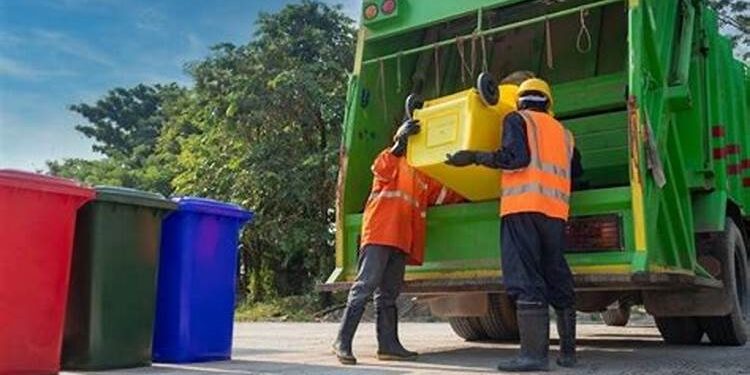Waste disposal can be one of those things that just gets piled up over time, doesn’t it? Whether you’re doing a home renovation, cleaning out your garage, or even just decluttering, figuring out what to do with all that junk can be a challenge. But here’s the thing: managing your waste doesn’t have to be a hassle. In fact, there are some super simple ways to streamline the entire process, making it not only easier but also more efficient.
Regularly Using Roll-Off Dumpster Rental
One of the most practical and simple waste disposal solutions, especially for large-scale cleanups, is to rent a roll-off dumpster. If you’ve ever been in a situation where your piles of junk seem to be growing faster than you can handle them, a roll-off dumpster is a game-changer. It’s one of those solutions that, once you use it, you wonder why you didn’t try it sooner.
Why is this such a great option? For starters, roll-off dumpsters are designed to handle large amounts of waste, whether you’re getting rid of construction debris, old furniture, or even yard waste. Instead of making endless trips to the dump (which, let’s be honest, takes up time and energy you don’t have), you just load everything into the dumpster and let someone else handle the heavy lifting.
The best part? You don’t have to worry about where to store the junk while you’re still sorting through everything. You get a dedicated space for disposal that can sit right on your property, making it super convenient. Plus, there are usually a range of sizes to choose from, so you can pick one that matches the scale of your project.
Sort and Organize Before Disposal
Once you’ve got your dumpster, the next step is sorting. It sounds simple enough, but if you’re not careful, things can quickly become chaotic. Organizing before disposal is key, and it can actually save you time in the long run. Here’s a thought: consider going room by room or project by project. Breaking down the cleanup into smaller chunks makes it feel much more manageable, and you won’t find yourself overwhelmed by a giant mess.
It’s also a good idea to separate recyclable materials from regular trash as you go. Many communities have specific rules about what can and can’t be recycled, so taking the extra step to sort these items before disposal can help reduce your environmental impact and avoid fines. Plus, it’s a small effort that can make a big difference.
Invest in Proper Containers
When dealing with waste disposal at home, it’s crucial to have the right tools for the job. This is where investing in proper containers—whether for sorting, storing, or just managing the waste—becomes really important. Think about it: you wouldn’t leave food in an open container in the kitchen, so why would you treat your trash any differently? By using designated bins for different materials, you make it easier to dispose of waste, and it helps keep your space clean in the process.
For example, a sturdy recycling bin is an absolute must, especially if your area has a robust recycling program. Make sure it’s large enough to handle the volume of recyclables you go through. Similarly, having a dedicated bin for yard waste (like branches, leaves, and grass clippings) will prevent your garage or driveway from turning into a dumping ground.
And don’t forget about trash bags—choose ones that are sturdy enough to hold heavy materials, and make sure they’re the right size for your containers. Trust me, you’ll thank yourself when you don’t have to deal with split bags and messes.
Set a Disposal Schedule
Waste disposal is one of those things that’s easy to put off, right? But by setting a regular disposal schedule, you can avoid that last-minute scramble to clear everything out. Whether it’s taking out the trash every week or setting aside time each month for a more thorough cleanup, having a routine in place helps keep things under control. The best part? It’s a lot less stressful when you’re not staring at a mountain of trash or a cluttered space.
One way to do this is to mark disposal tasks on your calendar. If you’re doing a big project, like a remodel or a garage clean-out, set specific days for taking out materials you no longer need. This makes the process feel a lot less overwhelming and helps you stay on track.
Reduce, Reuse, and Recycle
The golden rule of waste disposal is simple: Reduce, reuse, and recycle. The more you can minimize your waste in the first place, the less you’ll need to deal with in the long run. Take a step back and ask yourself: Is there a way I can reduce the amount of stuff I’m accumulating? Whether it’s opting for products with less packaging, choosing more sustainable materials, or simply buying fewer things, cutting back on waste is always a win.
Recycling is another huge part of this equation. Recycling programs vary depending on where you live, so it’s important to be familiar with the rules and what items are accepted. Some things—like electronics, batteries, and certain plastics—need to be disposed of in specific ways, so check with your local waste management company to find out what they offer. And, of course, make sure your recyclables are clean and dry before putting them in the bin.
Stay On Top of Your Waste Disposal
By staying organized, using the right tools, and scheduling regular waste disposal sessions, you can keep your home looking neat and clutter-free. Remember, the more you stay on top of it, the less of a headache it will become!


![7 Best POS Software in the UK [2026 Edition]](https://todaynews.co.uk/wp-content/uploads/2026/02/7-Best-POS-Software-in-the-UK-2026-Edition-360x180.png)








































































